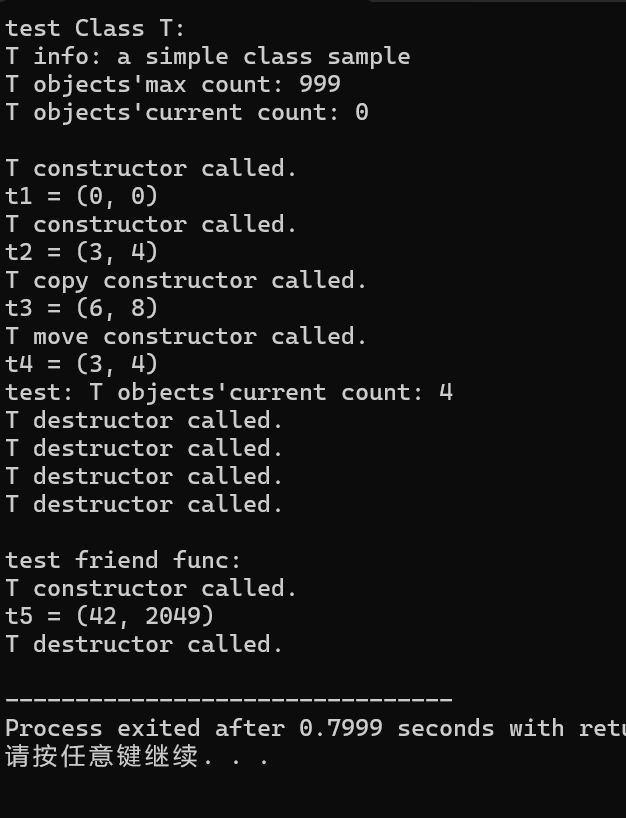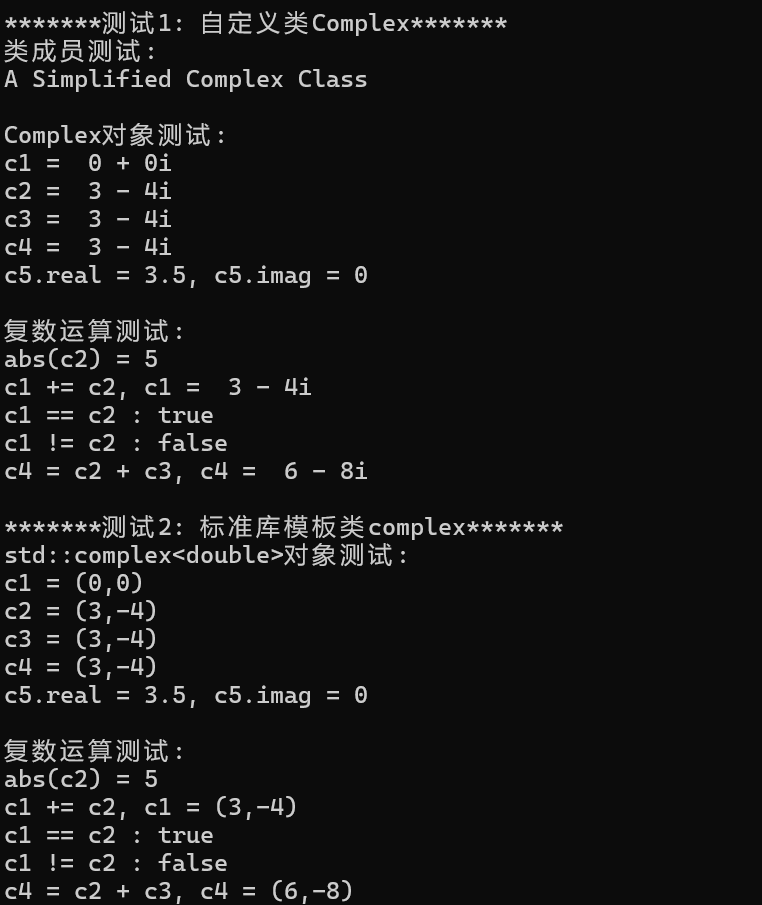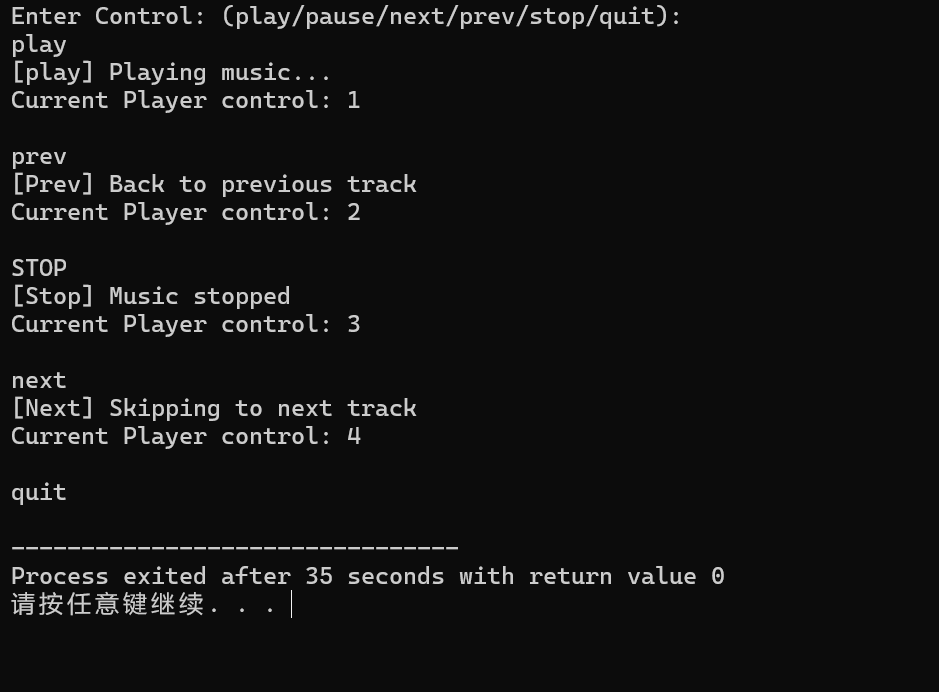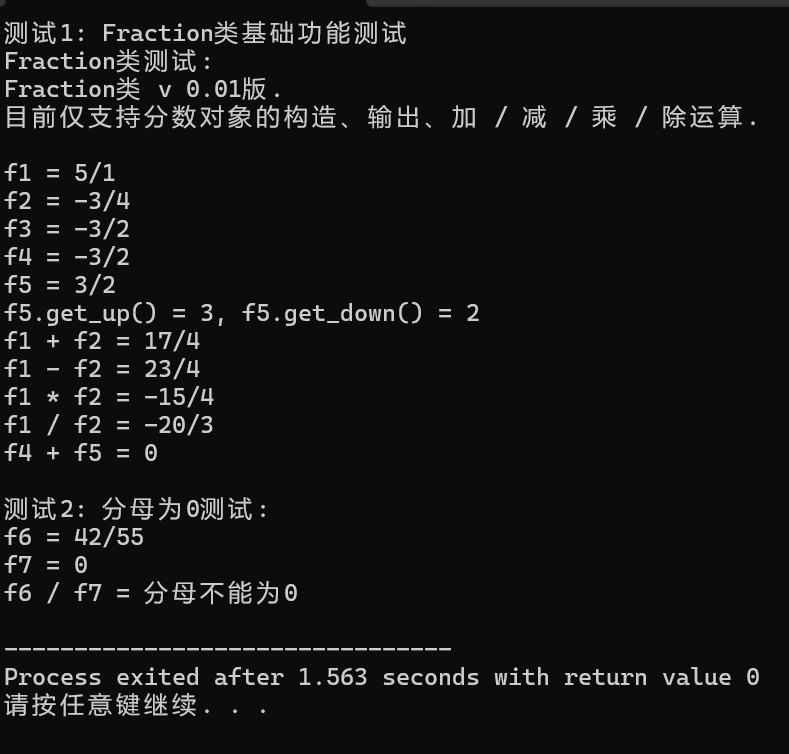OOP实验二
task1:
T.h:
1 #pragma once 2 3 #include <string> 4 5 // 类T: 声明 6 class T { 7 // 对象属性、方法 8 public: 9 T(int x = 0, int y = 0); // 普通构造函数 10 T(const T &t); // 复制构造函数 11 T(T &&t); // 移动构造函数 12 ~T(); // 析构函数 13 14 void adjust(int ratio); // 按系数成倍调整数据 15 void display() const; // 以(m1, m2)形式显示T类对象信息 16 17 private: 18 int m1, m2; 19 20 // 类属性、方法 21 public: 22 static int get_cnt(); // 显示当前T类对象总数 23 24 public: 25 static const std::string doc; // 类T的描述信息 26 static const int max_cnt; // 类T对象上限 27 28 private: 29 static int cnt; // 当前T类对象数目 30 31 // 类T友元函数声明 32 friend void func(); 33 }; 34 35 // 普通函数声明 36 void func();
T.cpp:
#include "T.h" #include <iostream> #include <string> // 类T实现 // static成员数据类外初始化 const std::string T::doc{"a simple class sample"}; const int T::max_cnt = 999; int T::cnt = 0; // 类方法 int T::get_cnt() { return cnt; } // 对象方法 T::T(int x, int y): m1{x}, m2{y} { ++cnt; std::cout << "T constructor called.\n"; } T::T(const T &t): m1{t.m1}, m2{t.m2} { ++cnt; std::cout << "T copy constructor called.\n"; } T::T(T &&t): m1{t.m1}, m2{t.m2} { ++cnt; std::cout << "T move constructor called.\n"; } T::~T() { --cnt; std::cout << "T destructor called.\n"; } void T::adjust(int ratio) { m1 *= ratio; m2 *= ratio; } void T::display() const { std::cout << "(" << m1 << ", " << m2 << ")" ; } // 普通函数实现 void func() { T t5(42); t5.m2 = 2049; std::cout << "t5 = "; t5.display(); std::cout << '\n'; }
task1.cpp:
1 include "T.h" 2 #include <iostream> 3 4 void test_T(); 5 6 int main() { 7 std::cout << "test Class T: \n"; 8 test_T(); 9 10 std::cout << "\ntest friend func: \n"; 11 func(); 12 } 13 14 void test_T() { 15 using std::cout; 16 using std::endl; 17 18 cout << "T info: " << T::doc << endl; 19 cout << "T objects'max count: " << T::max_cnt << endl; 20 cout << "T objects'current count: " << T::get_cnt() << endl << endl; 21 22 T t1; 23 cout << "t1 = "; t1.display(); cout << endl; 24 25 T t2(3, 4); 26 cout << "t2 = "; t2.display(); cout << endl; 27 28 T t3(t2); 29 t3.adjust(2); 30 cout << "t3 = "; t3.display(); cout << endl; 31 32 T t4(std::move(t2)); 33 cout << "t4 = "; t4.display(); cout << endl; 34 35 cout << "test: T objects'current count: " << T::get_cnt() << endl; 36 }
运行结果:

问题:
1)YES
2)普通构造函数在创建变量的时候调用;复制构造函数在创建变量的时候,但是传入的是该类的变量的时候使用 s1(s2),这样相当于把s2拷贝到了s1中;移动构造函数在进行 move操作的时候,负责将右值传递给新的变量;析构函数则在程序退出时调用。
3)
移动的函数重复定义
task2:
Complex.h:
1 #pragma once 2 #include <iostream> 3 #include<string> 4 5 class Complex{ 6 public: 7 Complex() : real(0.0),imag(0.0){}; 8 Complex(double r,double i=0.0) : real(r),imag(i){}; 9 Complex(const Complex &c) : real(c.real),imag(c.imag){}; 10 11 private: 12 float real,imag; 13 14 public: 15 static const std::string doc; 16 17 public: 18 double get_real() const; 19 double get_imag() const; 20 void add(const Complex &c); 21 22 friend void output(const Complex &c); 23 friend double abs(const Complex &c); 24 friend Complex add(const Complex &c1,const Complex &c2); 25 friend bool is_equal(const Complex &c1,const Complex &c2); 26 friend bool is_not_equal(const Complex &c1,const Complex &c2); 27 };
Complex.cpp:
#include"Complex.h" #include<iostream> #include<string> #include<cmath> #include <iomanip> const std::string Complex::doc{"a simplified complex class"}; double Complex::get_real()const { return real; } double Complex::get_imag()const { return imag; } void Complex::add(const Complex &c) { real += c.real; imag += c.imag; } void output(const Complex &c) { if (c.imag >= 0) { std::cout << std::setw(2) << c.real<< " + " << c.imag << "i"; } else { std::cout << std::setw(2) << c.real << " - " << -c.imag << "i"; } } double abs(const Complex &c) { return std::sqrt(c.real * c.real + c.imag * c.imag); } Complex add(const Complex &c1,const Complex &c2) { return Complex(c1.real + c2.real,c1.imag + c2.imag); } bool is_equal(const Complex &c1,const Complex &c2) { if(c1.real==c2.real&&c1.imag==c2.imag) { return true; } else { return false; } } bool is_not_equal(const Complex &c1,const Complex &c2) { return !is_equal(c1,c2); }
task2.cpp:
#include"Complex.h" #include <iostream> #include <iomanip> #include <complex> void test_Complex(); void test_std_complex(); int main() { std::cout << "*******测试1: 自定义类Complex*******\n"; test_Complex(); std::cout << "\n*******测试2: 标准库模板类complex*******\n"; test_std_complex(); } void test_Complex() { using std::cout; using std::endl; using std::boolalpha; cout << "类成员测试: " << endl; cout << Complex::doc << endl << endl; cout << "Complex对象测试: " << endl; Complex c1; Complex c2(3, -4); Complex c3(c2); Complex c4 = c2; const Complex c5(3.5); cout << "c1 = "; output(c1); cout << endl; cout << "c2 = "; output(c2); cout << endl; cout << "c3 = "; output(c3); cout << endl; cout << "c4 = "; output(c4); cout << endl; cout << "c5.real = " << c5.get_real() << ", c5.imag = " << c5.get_imag() << endl << endl; cout << "复数运算测试: " << endl; cout << "abs(c2) = " << abs(c2) << endl; c1.add(c2); cout << "c1 += c2, c1 = "; output(c1); cout << endl; cout << boolalpha; cout << "c1 == c2 : " << is_equal(c1, c2) << endl; cout << "c1 != c2 : " << is_not_equal(c1, c2) << endl; c4 = add(c2, c3); cout << "c4 = c2 + c3, c4 = "; output(c4); cout << endl; } void test_std_complex() { using std::cout; using std::endl; using std::boolalpha; cout << "std::complex<double>对象测试: " << endl; std::complex<double> c1; std::complex<double> c2(3, -4); std::complex<double> c3(c2); std::complex<double> c4 = c2; const std::complex<double> c5(3.5); cout << "c1 = " << c1 << endl; cout << "c2 = " << c2 << endl; cout << "c3 = " << c3 << endl; cout << "c4 = " << c4 << endl; cout << "c5.real = " << c5.real() << ", c5.imag = " << c5.imag() << endl << endl; cout << "复数运算测试: " << endl; cout << "abs(c2) = " << abs(c2) << endl; c1 += c2; cout << "c1 += c2, c1 = " << c1 << endl; cout << boolalpha; cout << "c1 == c2 : " << (c1 == c2)<< endl; cout << "c1 != c2 : " << (c1 != c2) << endl; c4 = c2 + c3; cout << "c4 = c2 + c3, c4 = " << c4 << endl; }
运行结果

问题:
1)单从简洁上看,标准库模板类会更加简洁,但从整体修改与查找BUG上,自定义会更方便;运算与逻辑构成函数,函数算是对运算的集合与调用
2)【1】是的,因为涉及运算和显示确实需要访问实部和虚部
【2】不是,在complex中有相关接口
【3】在需要直接访问私有成员的时候
3)不会
task3:
PlayerControl.h:
#pragma once #include <string> enum class ControlType {Play, Pause, Next, Prev, Stop, Unknown}; class PlayerControl { public: PlayerControl(); ControlType parse(const std::string& control_str); // 实现std::string --> ControlType转换 void execute(ControlType cmd) const; // 执行控制操作(以打印输出模拟) static int get_cnt(); private: static int total_cnt; };
PlayerControl.cpp:
#include "PlayerControl.h" #include <iostream> #include<cctype> #include <algorithm> int PlayerControl::total_cnt = 0; PlayerControl::PlayerControl() {} // 待补足 // 1. 将输入字符串转为小写,实现大小写不敏感 // 2. 匹配"play"/"pause"/"next"/"prev"/"stop"并返回对应枚举 // 3. 未匹配的字符串返回ControlType::Unknown // 4. 每次成功调用parse时递增total_cnt ControlType PlayerControl::parse(const std::string& control_str) { std::string lower_str; for(char c : control_str) { lower_str += std::tolower(c); } if(lower_str == "play") { total_cnt++; return ControlType::Play; } else if(lower_str == "pause") { total_cnt++; return ControlType::Pause; } else if(lower_str == "next") { total_cnt++; return ControlType::Next; } else if(lower_str == "prev") { total_cnt++; return ControlType::Prev; } else if(lower_str == "stop") { total_cnt++; return ControlType::Stop; } else { return ControlType::Unknown; } } void PlayerControl::execute(ControlType cmd) const { switch (cmd) { case ControlType::Play: std::cout << "[play] Playing music...\n"; break; case ControlType::Pause: std::cout << "[Pause] Music paused\n"; break; case ControlType::Next: std::cout << "[Next] Skipping to next track\n"; break; case ControlType::Prev: std::cout << "[Prev] Back to previous track\n"; break; case ControlType::Stop: std::cout << "[Stop] Music stopped\n"; break; default: std::cout << "[Error] unknown control\n"; break; } } int PlayerControl::get_cnt() { return total_cnt; }
task3.cpp:
task3#include "PlayerControl.h" #include <iostream> void test() { PlayerControl controller; std::string control_str; std::cout << "Enter Control: (play/pause/next/prev/stop/quit):\n"; while(std::cin >> control_str) { if(control_str == "quit") break; ControlType cmd = controller.parse(control_str); controller.execute(cmd); std::cout << "Current Player control: " << PlayerControl::get_cnt() << "\n\n"; } } int main() { test(); }
运行结果:

task4:
Fraction.h:
#pragma once #include<iostream> class Fraction { private: int up; int down; public: static std::string doc; Fraction(int a, int b = 1); Fraction(const Fraction& other) ; ~Fraction(); int get_up() const; int get_down() const; Fraction negative(); friend void output(const Fraction &c); friend Fraction add(const Fraction &a, const Fraction &b); friend Fraction sub(const Fraction &a,const Fraction &b); friend Fraction mul(const Fraction &a,const Fraction &b); friend Fraction div(const Fraction &a, const Fraction &b); friend int gcd(int x, int y); };
Fraction.cpp:
#include "Fraction.h" #include <iostream> #include<cmath> std::string Fraction::doc="Fraction类 v 0.01版.\n目前仅支持分数对象的构造、输出、加 / 减 / 乘 / 除运算."; int gcd(int x, int y) { int a = abs(x); int b = abs(y); while (b != 0) { int temp = b; b = a % b; a = temp; } return a; }; Fraction::Fraction(int a, int b) :up(a), down(b) { if (b < 0) { up=-up; down=-down; } int n = gcd(up, down); up = up / n; down = down / n; }; Fraction::Fraction(const Fraction& other) { up = other.up; down = other.down; }; Fraction::~Fraction() {}; int Fraction::get_up() const { return up; }; int Fraction::get_down() const { return down; }; Fraction Fraction::negative() { int negative_up = -up; if(negative_up<0&&down<0) return Fraction(-negative_up,-down); else return Fraction(negative_up, down); }; void output(const Fraction& c) { int n=gcd(c.up, c.down); if(c.up<0&&c.down<0) std::cout << -c.up / n << "/" << -c.down / n; if (c.down == 0) { std::cout << "分母不能为0"; return ; } if (c.up == 0) std::cout << "0"; else std::cout << c.up / n << "/" << c.down / n; } Fraction add(const Fraction &a, const Fraction &b) { if (a.down == b.down) return Fraction(a.up + b.up, a.down); else { return Fraction(a.up * b.down + b.up * a.down, b.down * a.down ); } }; Fraction sub(const Fraction &a,const Fraction &b) { if (a.down == b.down) return Fraction(a.up -b.up, a.down); else { return Fraction(a.up * b.down -b.up * a.down, b.down * a.down ); } }; Fraction mul(const Fraction& a,const Fraction& b) { return Fraction(a.up * b.up , a.down * b.down ); }; Fraction div(const Fraction& a,const Fraction& b) { return Fraction(a.up * b.down , a.down * b.up ); };
task4.cpp:
#include "Fraction.h" #include <iostream> void test1(); void test2(); int main() { std::cout << "测试1: Fraction类基础功能测试\n"; test1(); std::cout << "\n测试2: 分母为0测试: \n"; test2(); } void test1() { using std::cout; using std::endl; cout << "Fraction类测试: " << endl; cout << Fraction::doc << endl << endl; Fraction f1(5); Fraction f2(3, -4), f3(-18, 12); Fraction f4(f3); cout << "f1 = "; output(f1); cout << endl; cout << "f2 = "; output(f2); cout << endl; cout << "f3 = "; output(f3); cout << endl; cout << "f4 = "; output(f4); cout << endl; const Fraction f5(f4.negative()); cout << "f5 = "; output(f5); cout << endl; cout << "f5.get_up() = " << f5.get_up() << ", f5.get_down() = " << f5.get_down() << endl; cout << "f1 + f2 = "; output(add(f1, f2)); cout << endl; cout << "f1 - f2 = "; output(sub(f1, f2)); cout << endl; cout << "f1 * f2 = "; output(mul(f1, f2)); cout << endl; cout << "f1 / f2 = "; output(div(f1, f2)); cout << endl; cout << "f4 + f5 = "; output(add(f4, f5)); cout << endl; } void test2() { using std::cout; using std::endl; Fraction f6(42, 55), f7(0, 3); cout << "f6 = "; output(f6); cout << endl; cout << "f7 = "; output(f7); cout << endl; cout << "f6 / f7 = "; output(div(f6, f7)); cout << endl; }




 浙公网安备 33010602011771号
浙公网安备 33010602011771号